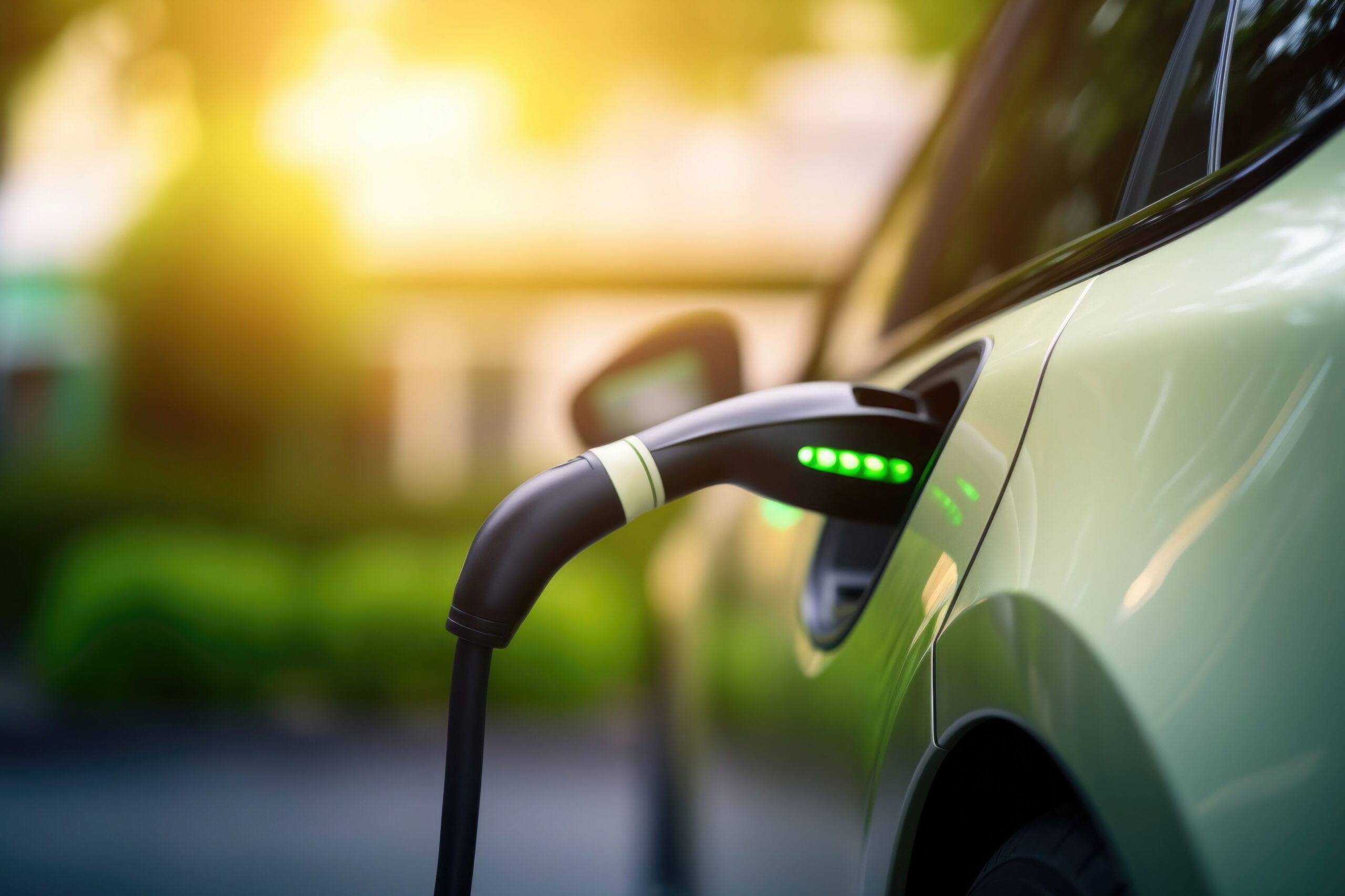EV disputes brought by consumers to The Motor Ombudsman in Q2 2025
Overview of EV disputes brought to The Motor Ombudsman relative to UK new car registrations and the overall automotive parc
Before presenting the profile and volume of electric vehicle (EV) disputes received by The Motor Ombudsman from consumers, it is important to understand the trend of EV disputes in relation to both EV and non-EV new car registrations (i.e. petrol, diesel and hybrid models), and the overall EV and non-EV vehicle parc.
When looking at the proportion of disputes received by The Motor Ombudsman versus new registrations on an annual basis for electric vehicles and non-electric models (i.e. petrol diesel and hybrid), as shown in Tables 1 and 2, it is possible to conclude that EVs generate far fewer complaints per vehicle than non-EV equivalents. For example, based on the latest 2024 full-year data, EVs were generating one dispute for every 195 cars, compared to one in every 41 vehicles for a petrol, diesel, or hybrid variant.
A similar picture can also be seen when comparing the volume of EV disputes to the combined car parc, with the two-year combined parc equating to one complaint in every 202 cars, extending to one in every 283 for the four-year combined parc. In contrast, for ICE and hybrid equivalent models, this rises to one dispute in every 51 cars for the two-year combined parc, and one in every 61 vehicles for the four-year combined parc, highlighting the variation between the powertrains.
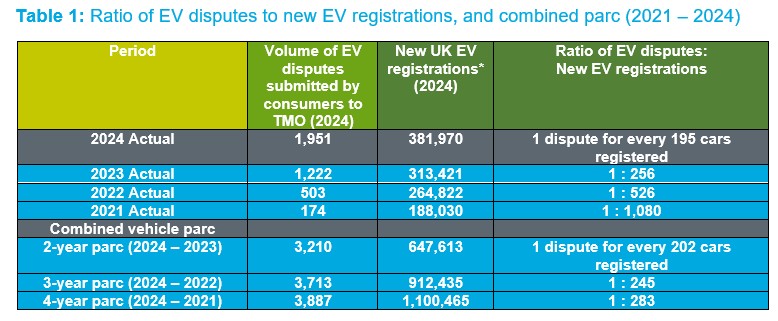
For the second quarter of 2025, the ratio of EV disputes (676) received by The Motor Ombudsman to new EV registrations (104,650) equates to one dispute for every 154 new EVs registered.
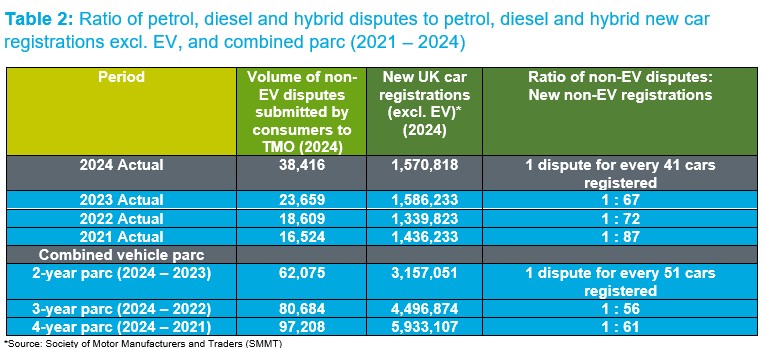
For the second quarter of 2025, the ratio of non-EV disputes received by The Motor Ombudsman (12,734) to new non-EV registrations (357,067) stands at one dispute for every 28 new non-EVs registered.
Overview of EV disputes received in Q2 2025
In the second quarter of 2025, The Motor Ombudsman received a total of 676 disputes from consumers in relation to an electric vehicle (EV). This is up marginally from the volume witnessed in the first quarter of the year (641), and equates to a 35% increase versus the same period in 2024 (502), reflecting the growing battery electric car parc and EV new car registrations in the UK, which rose by 26% in Q2 2025 (as shown in Table 3 below).
For June year-to-date, there have been 1,317 disputes logged with The Motor Ombudsman about EVs, up 32% compared to the opening six months of 2024 (994).
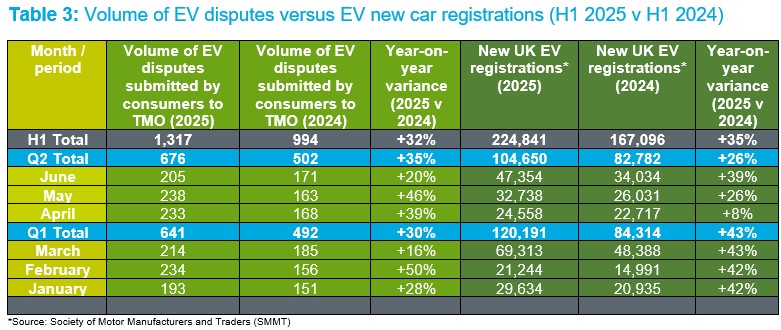
When looking at the main issues encountered by consumers with an EV during the second quarter of 2025, they are as follows:
1. Customer service and purchase issues (47%)
Customer service issues at the point of purchase or during ownership were the source of the majority and close to half of EV-related disputes received by The Motor Ombudsman between 01 April and 30 June. Complaints were driven by factors, such as incorrect orders being placed at the point of sale, sellers not informing consumers about prior accident damage, and being mis-sold paint protection products.
At the time of handover, dissatisfaction equally stemmed from damage or missing keys and service books, and being asked to pay different prices to those listed by retailers, whilst owners also reported vehicle functions being deactivated remotely in the absence of customer consent.
2. Chassis and motor issues (11%)
Between April and June, just over 10% of disputes submitted to The Motor Ombudsman during the past three months were driven by issues around the ‘running gear’ of a car. Examples of concerns raised, included vehicles changing ride heights with no prior warning, knocking suspension, wheel balancing issues, and tyres wearing unevenly.
3. Electrical and software issues (11%)
Concerns with the electrical infrastructure of an electric vehicle caused the same proportion of complaints as the aforementioned category in the second quarter of 2025. Causes of disputes during ownership originated from corroding and failing wiring looms, vehicles losing internet connectivity, software faults causing pre-conditioning failures and preventing vehicles from starting, and in contrast, cars shutting down without notice.
4. Interior and cabin systems issues issues (9%)
The cabin area of an electric vehicle was the fourth most prominent area of EV disputes. Problems reported about the interior and in-car systems, were namely infotainment screens repeatedly freezing or going completely blank, sound being distorted by speakers, and seat heaters not working. Splitting seat covers and stitching detaching, and water ingress in the boot, also drove consumers to log a complaint with The Motor Ombudsman during the second quarter of 2025.
5. Battery issues (7%)
Batteries are critical components of EVs, and can inhibit their operation when faults are present. Principal concerns highlighted by consumers counted 12 Volt batteries being drained by vehicle systems, battery coolant issues, as well as cracks developing in coolant pipes.
6. Exterior issues (6%)
Complaints associated with the bodywork of a vehicle stayed at 6% – the same proportion as that seen in the first quarter of 2025. Disputes raised during the last three months in this area originated from paint chipping on bumpers, delaminating paintwork, whilst consumers also reported repairers respraying panels to a poor standard. In terms of external fixtures, owners expressed disappointment with water entering headlights, electric wing mirrors ceasing to function, and cracks appearing in panoramic sunroofs.
7. Charging issues (6%)
Not being able to charge an EV can be a significant source of frustration and inconvenience for users. Problems described by consumers in their case submissions to The Motor Ombudsman, pertained to vehicles not being able to charge to their full potential, faults after periods of heavy rain, charging ports locking, and faulty onboard AC chargers.
8. Range issues (3%)
Complaints about range were largely centred around claims that the actual range available for a full charge did not meet advertised figures, thereby leading to a sentiment that vehicles had been mis-sold by retailers and not meeting the needs of customers.
Average consumer claim value
For consumers who stated a monetary value to resolve their complaint with a business, the average stood at £8,659 for Q2 2025 – a very similar statistic seen for the same three-month period in 2024 (£8,729).
To view and download the infographic below as a PDF, please click here.
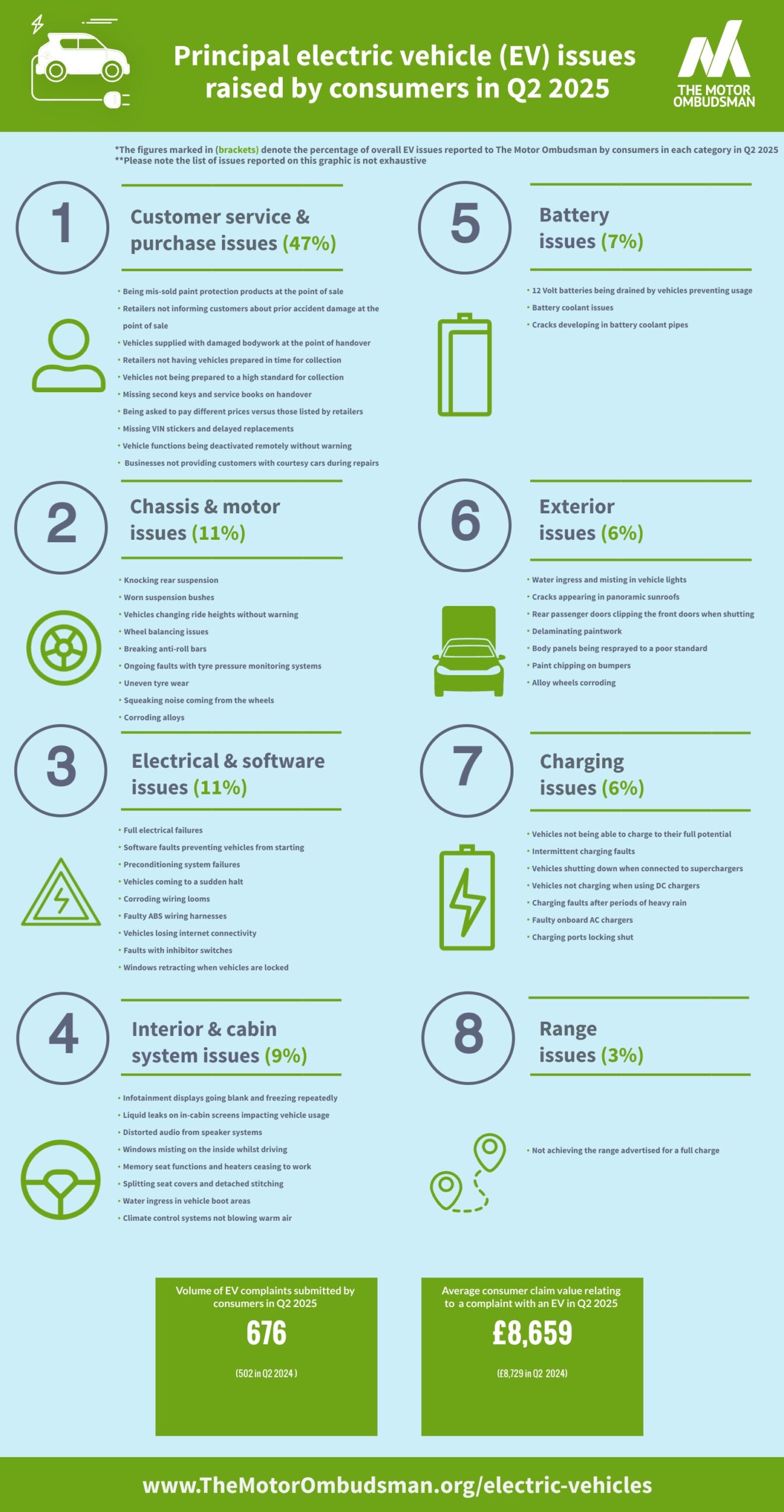
To view and download The Motor Ombudsman’s thought leadership paper on electric vehicle disputes as a PDF, please click here.

